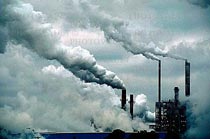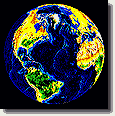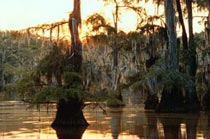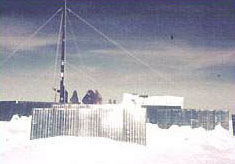| (insert your NIE or newspaper logo here) |
Weekly Online LessonOnline Lesson ArchiveGrade Level: 7-12
|
Tracking Climate Change
 When
the U.S. government made the Clean Air Act a law in 1990, it was a monumental
move aimed at protecting the nation's air quality and helping to ensure
a healthy environment for future generations.
When
the U.S. government made the Clean Air Act a law in 1990, it was a monumental
move aimed at protecting the nation's air quality and helping to ensure
a healthy environment for future generations.
Some say, however, that the Environmental Protection Agency's (EPA) enforcement of the Clean Air Act, which many believe requires the agency to protect Americans against all harmful pollutants, including emissions that damage the climate and contribute to global warming, doesn't go far enough.
For example, on Thursday, October 23, 2003, in the Court of Appeals for the D.C. Circuit, 12 states, several cities, and over a dozen environmental groups challenged the EPA's statement that the agency doesn't have authority to regulate certain emissions, including carbon dioxide.
The EPA claims that carbon dioxide and some other chemicals released through industrial processes don't meet the Clean Air Act's definition of "pollutant." The current pollutants, designated as hazardous to human health and subject to EPA standards, are carbon monoxide, lead, nitrogen oxides, ozone, particulate matter, and sulfur oxides.
 Some
believe that other ways for curbing global warming exist, and that such
stricter air quality regulations, imposed upon commercial industries
in particular, would hamper economic growth in the United States. Such
measures could also sharply raise energy prices for consumers.
Some
believe that other ways for curbing global warming exist, and that such
stricter air quality regulations, imposed upon commercial industries
in particular, would hamper economic growth in the United States. Such
measures could also sharply raise energy prices for consumers.
Although not everyone agrees why it's happening, most everyone does agree that climate change is real. Ice caps and glaciers are shrinking, ocean levels are rising, flooding happens more frequently, natural habitats are shifting, and air temperatures, generally, are warming. The debate continues, though, over how exactly to mitigate these large-scale environmental changes.
As scientists, politicians, and regular citizens try to agree on what to do about climate change and its effects on us, everyone would benefit by understanding how the different systems of the Earth work together. So this week, you'll discover how scientists track climate change — from the air, under the oceans, and into ecosystems — and find out how these changes will likely affect our future.
The Burning Issue
 This
week's lesson starts at the Science Museum in the United Kingdom (UK),
at their online exhibit, Climate
Change: the Burning Issue. Here, you will get a good introduction
into what climate change is, what seem to be the causes, some of the
ways scientists are measuring the changes, and what these changes will
mean to our future.
This
week's lesson starts at the Science Museum in the United Kingdom (UK),
at their online exhibit, Climate
Change: the Burning Issue. Here, you will get a good introduction
into what climate change is, what seem to be the causes, some of the
ways scientists are measuring the changes, and what these changes will
mean to our future.
Begin exploring with the top section, Antenna answers your questions about climate change. Move through the section into Questions answered, including What's climate change? and What's the problem?
If you'd like a quick primer on terms related to these issues, also check out the Jargon-buster section on Climate questions and The Earth's atmosphere. Also read about Whose fault it is.
So what exactly is climate change? How are the recent changes different from previous times? What's the difference between climate and weather? What exactly are some of the greenhouse gases, and how does the greenhouse effect work?
 Move
onto the next section, Measuring
our changing climate. Browse through the different viewpoints
of climate change — Earth
story, Air
story, Ocean
story, and Ice
story.
Move
onto the next section, Measuring
our changing climate. Browse through the different viewpoints
of climate change — Earth
story, Air
story, Ocean
story, and Ice
story.
What evidence of climate change are scientists observing in these different areas? Which changes are biotic and which are abiotic? In what ways have technological developments helped scientists measure the various environmental indicators?
Next, explore how scientists are Predicting our future based on the evidence. Browse the section, beginning with Predicting the future, which explains how scientists use computer models to help estimate conditions in future. How have these computer models helped us understand how the different systems of the Earth work together and affect each other?
Also read about why Examining the past is important to understanding climate conditions today, and check out What's in store to see how humans will need to prepare as these environmental trends continue.
 Continue
browsing through the next sections, Living
with the consequences, Facing
up to climate change, and Saving
the planet: a DIY guide.
Continue
browsing through the next sections, Living
with the consequences, Facing
up to climate change, and Saving
the planet: a DIY guide.
If you were to live 100 years or more, what sorts of ways might global warming influence your life? In what ways would whole communities be affected? How would these conditions influence local, regional, national, and global politics and business?
How are advancements in technology helping to mitigate these conditions? What can consumers, politicians, and business people do now to improve upon our future's worst-case scenarios?
If you have time, Play the game: Battle for the planet. How did you score on your carbon lifestyle? How much did each choice make a difference?
Climate Change at the Exploratorium
 You've
now had a good introduction to what climate change is and how scientists
are tracking indicators of it over time. Your next stop, the Exploratorium's
Global
Climate Change site, is similar to the Science Museum site,
except that it illustrates even more ways in which scientists are measuring
changes.
You've
now had a good introduction to what climate change is and how scientists
are tracking indicators of it over time. Your next stop, the Exploratorium's
Global
Climate Change site, is similar to the Science Museum site,
except that it illustrates even more ways in which scientists are measuring
changes.
Since you've already been introduced to this subject, you can skip the Overview of Climate Change Research, unless you'd like to read a different and more in-depth viewpoint.
Visit each of the Earth's "spheres" of nature — the atmosphere, the hydrosphere, the cryosphere, and the biosphere.
After reading the introduction for each section, click on any or all of the graphics to learn more about how that visualization was created based on short-term or long-term data.
 How
do scientists piece together each of these values and types of data
samplings to understand how the Earth works? In what ways are biotic
and abiotic conditions linked to one another?
How
do scientists piece together each of these values and types of data
samplings to understand how the Earth works? In what ways are biotic
and abiotic conditions linked to one another?
Also check out the predicted global effects of climate change. How could global warming affect air and water temperatures, as well as the spread of disease? How will these predictions influence where people live?
How would you suggest we balance the desires of consumers and commercial industries with the fundamental needs of clean air and water, food, other plants and animals, etc.?
Newspaper Activities
In a current issue of Targetnewspaper, look for stories about the emissions court case involving the EPA. Also find articles related to climate change that may highlight work done by scientists or laws passed by federal or state government. Does the news help or hinder efforts to slow down climate change? If the news is related to science, do the new findings support or dispel previously held viewpoints on climate change? What were some of the variables and assumptions in the study? If the news is related to politics, do the opinions or statements of the politicians seem to be based on scientific evidence? If not, why do you think that's the case?
© Copyright 2003
Learners Online, Inc.
